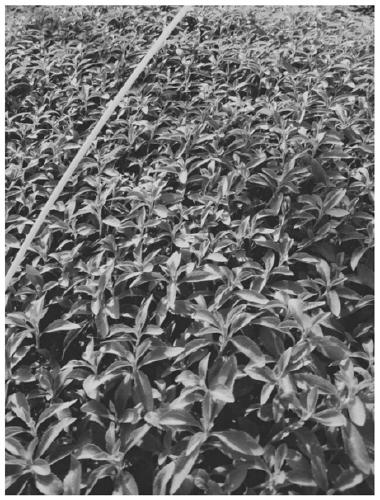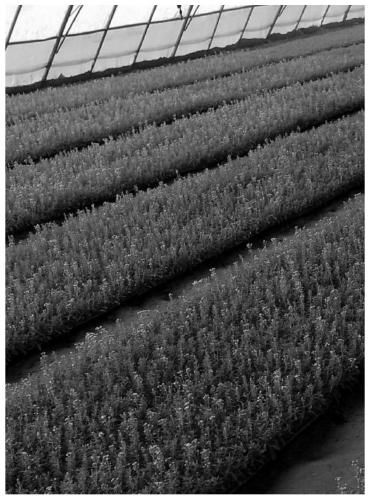Method for inhibiting blooming of stevia rebaudiana seedlings through regulation and control of LED lamp illumination
An LED lamp and stevia technology, which is applied in horticultural methods, botanical equipment and methods, leaf crop cultivation, etc., can solve the problems of unfavorable stevia rapid reproduction, high energy consumption under sunlight conditions, poor applicability, etc.
- Summary
- Abstract
- Description
- Claims
- Application Information
AI Technical Summary
Problems solved by technology
Method used
Image
Examples
Embodiment 1
[0034] In September 2018 (the dark period of this season is roughly between 19:00-08:00), in the solar greenhouse of the Gansu Agricultural Engineering Technology Research Institute, "LED red light (660nm) control treatment at different periods of the dark period of stevia cutting seedlings was carried out. test". Red LED lights are uniformly set in the shed, and the LED light intensity is 170μmol / (m 2 .s), the output power is 30W.
[0035] The coverage diameter of the LED light is 4m, and the height when it shines on the seedlings to achieve the best brightness is 1.5m; the installation distance of the LED lights is 3.5-4m, and the installation height of the LED lights from the seedlings is about 1.5m, ensuring that the LED lights cover all the seedbeds , leaving no dead ends; all LED lights use a time-controlled switch for intelligent control.
[0036] Sources of cuttings include:
[0037] 1. The stem section of the seedling grows to 7-8 pairs of leaves;
[0038] 2. Youn...
Embodiment 2
[0046] In February 2019, on the basis of Example 1, the "Stevia rebaudiana cuttage seedling dark stage middle stage LED red light (660nm) different light time regulation and treatment experiment" was carried out in the solar greenhouse of Gansu Agricultural Engineering Technology Research Institute, the test greenhouse Cover / remove the quilt curtain regularly every day, and the dark period is greater than 12h.
[0047] Sources of cuttings include:
[0048] 1. The stem section of the seedling grows to 7-8 pairs of leaves;
[0049] 2. Young shoots germinated from old roots grow to 7-8 pairs of leaves;
[0050]3. The newly germinated side branches on the plant to be multiplied grow 7-8 pairs of leaves;
[0051] Cut the stem section with 5-6 pairs of leaves from the above-mentioned seedling stem section, the young shoot section germinated from the old root, and the top of the newly germinated side branch, and carry out cutting seedling cultivation in the test greenhouse, normall...
Embodiment 3
[0057] In September 2019, on the basis of Example 2, the test plan was improved, and the "Experiment on the influence of different red and blue light ratios on the budding and flowering of stevia cuttings in the mid-dark period" was carried out in the solar greenhouse of Gansu Agricultural Engineering Technology Research Institute. .
[0058] Replace the red LED lamp with a combination of red and blue LED lamps. The test set the combination of 660nm red light (95%) and 460nm blue light (5%) (treatment 1), the combination of 660nm red light (85%) and 460nm blue light (15%) (Treatment two), combination of 660nm red light (75%) and 460nm blue light (25%) (treatment three), combination of 660nm red light (65%) and 460nm blue light (35%) (treatment four), 660nm red light (55%) %) combined with 460nm blue light (45%) (treatment five) for 5 treatments; the total light intensity of each group of LED lamps was 170 μmol / (m 2 .s), the output power is 35W.
[0059] After transplanting t...
PUM
 Login to View More
Login to View More Abstract
Description
Claims
Application Information
 Login to View More
Login to View More - R&D
- Intellectual Property
- Life Sciences
- Materials
- Tech Scout
- Unparalleled Data Quality
- Higher Quality Content
- 60% Fewer Hallucinations
Browse by: Latest US Patents, China's latest patents, Technical Efficacy Thesaurus, Application Domain, Technology Topic, Popular Technical Reports.
© 2025 PatSnap. All rights reserved.Legal|Privacy policy|Modern Slavery Act Transparency Statement|Sitemap|About US| Contact US: help@patsnap.com


